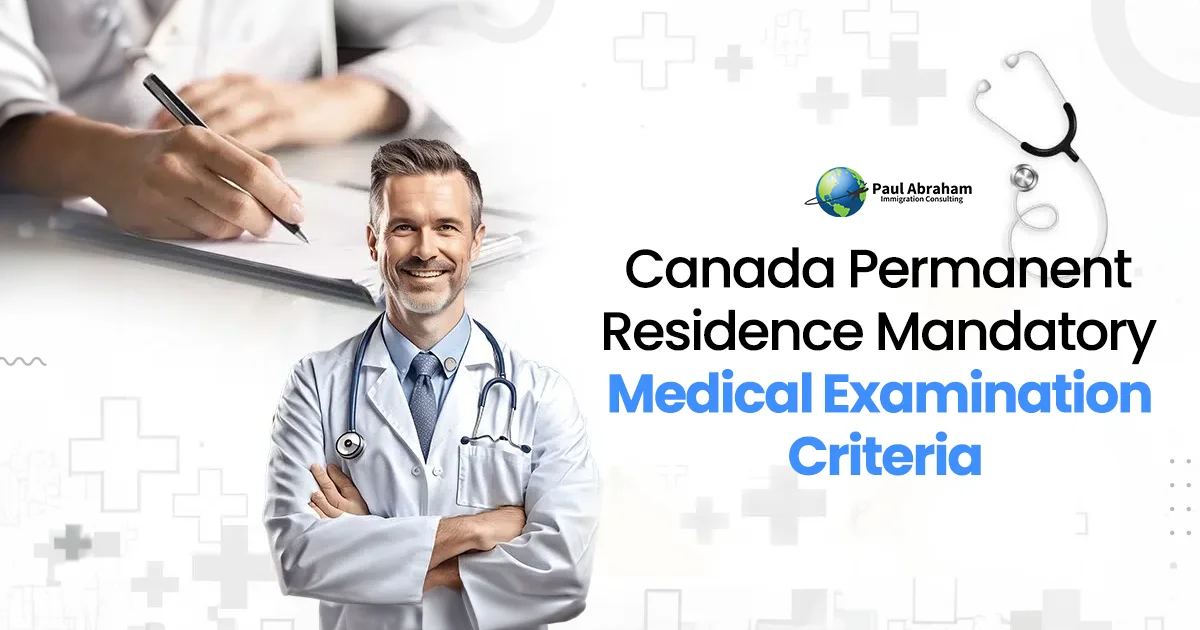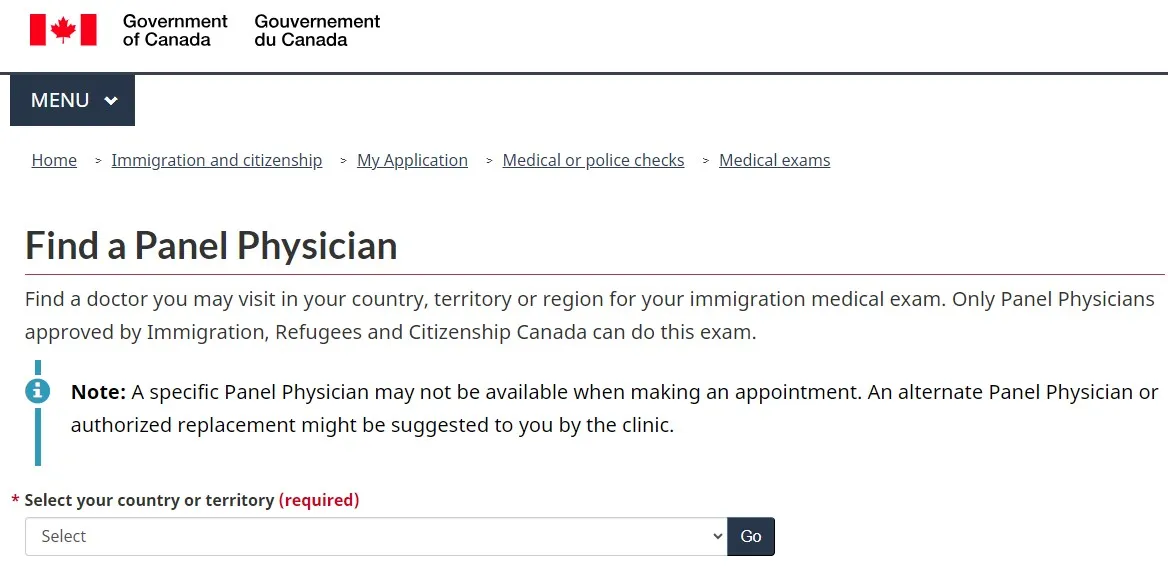Canada Permanent Residence Mandatory Medical Examination Criteria

Last Updated On : April 03 , 2024
All individuals applying for permanent residency, along with their accompanying spouses, partners, and dependent children, must undergo a PR medical examination.
Whether it's an international student pursuing higher education or a skilled worker from abroad, all immigrants must undergo medical assessments, including those applying through the Medical Exam for Express Entry system.
Your ability to migrate to Canada hinges on your good health status as common law mandates. To address all inquiries regarding Canada's health examination requirements, here is a concise overview that every prospective Permanent Resident applicant should be aware of.
List of Medical Exams Required to Immigrate to Canada
The medical tests required for a Canada visa vary depending on the traveler's needs or type of application. Temporary Residency and Permanent Residency have distinct requirements.
Detailed Physical Examination: This involves a thorough assessment of basic physical attributes such as the nose, eyes, heart, and lungs. Past major health issues can be discussed with the physician, with positive outcomes if they don't impact current health.
X-rays: These are conducted to identify any underlying issues within the body. Pregnant women typically avoid X-rays to ensure the health of the fetus, with prescribed tests for mother and baby post-birth.
Blood Tests: Samples are collected to detect major diseases like tuberculosis, HIV, or syphilis. This test is crucial for diagnosing various other illnesses that may affect health.
Urine Tests: A detailed examination of urine samples helps identify potential medical issues such as diabetes or other major illnesses.
For more information on what's included in the medical exam immigration and what is checked, continue reading.
Medical Examination Process After Arriving in Canada
For immigration purposes, only an approved panel physician is authorised to conduct a comprehensive medical examination.
Upon your arrival, the Panel Physician or clinic staff will verify your identity with identification. If you are referred for x-rays or other tests, you may need to present your identification again. Your photo will also be taken for record-keeping purposes.
Medical History Questionnaire:
The doctor will complete a medical history questionnaire with you, focusing on any past or present medical conditions and medications you may be taking. It's crucial to disclose all medical history to avoid potential delays in processing your medical examination.
Physical Examination:
You will undergo a physical examination, during which the doctor or clinic staff will:
- Measure your weight and height
- Assess your hearing and vision
- Check your blood pressure and pulse
- Listen to your heart and lungs
- Examine your abdomen, limbs, and skin
Other Tests:
Depending on your age, chest x-rays and laboratory tests may be conducted at the clinic or a laboratory for routine screening. Abnormal results will be discussed with you, and further testing by a specialist may be recommended.
If you have any concerns or feel uneasy during the exam, don't hesitate to ask the panel physician to pause and address your concerns.
Who Should Apply for it?
Single Immigrant:
Canada upholds strict standards regarding the health and well-being of its residents to safeguard public health and safety. As part of the Canada PR application process<, applicants are required to undergo medical tests for a Canada visa:
Moving to Canada with Family:
It's mandatory for dependents, such as spouses, partners, and dependent children, to undergo these tests along with the primary applicant.
Medical Test For TRs in Canada:
Even temporary residents, such as visitors or live-in caregivers, are subject to the Canada immigration medical test procedure.
These measures ensure compliance with medical exams for work permits and immigration checks, maintaining the health standards essential for entering and residing in Canada.
Where Should You Get Your Medical Tests Done?

Prospective applicants for Canadian immigration have the option to undergo their medical examinations either in their country of origin or in their current country of residence.
However, it's imperative that the examination is conducted by a physician who's listed on the panel of physicians approved by the Canadian IRCC (Immigration, Refugees, and Citizenship Canada) for it to be deemed valid.
These panel physicians, designated by the Canadian IRCC, possess the necessary licensing to authenticate medical examinations for individuals applying for immigration, ensuring compliance with IRCC medical exam requirements.
Documents Required for Medical Exam:
The medical exam for PR, required documents include:
- Valid government-issued identification with photo and signature.
- Passport or approved alternative ID such as a national identity card.
- Eyeglasses or contact lenses if worn.
- Medical reports or test results for any previous or existing conditions.
- List of current medications.
- Upon completion of upfront medical tests, you will be provided with the Medical Report form. (IMM 1017E or IMM 1020E)
This requirement is applicable to individuals staying for more than 6 months, those with recent travel to certain countries, and applicants for the parent and grandparent super visa.
Immigration Medical Exam Pricing:
The medical exam cost for Canada immigration visa applications can vary depending on factors such as diagnostic needs, the administering physician for your IME (Immigration Medical Examination), and the individual's age and health status.
Typically, the cost of the Canadian Immigration medical examination ranges from approximately CAD 140 to CAD 280.
Processing Time:
Medical check reports for Canada student visa or PR visa applications may take approximately one month to process for temporary residents and up to three months for permanent residents.
Validity of Medical Documents?
Health certificate validity: Once issued by a panel physician for the IRCC medical exam, it is valid for 12 months.
If the validity period expires, even by a day, applicants must undergo the medical examination process again to obtain a new clearance.
Conclusion
Undergoing a medical exam is a crucial step in the immigration process to Canada, ensuring the health and safety of both applicants and the public. From temporary residents to permanent residents, complying with CIC medical exam requirements is essential for successful visa applications.
For expert guidance and assistance throughout the immigration journey, consider partnering with Paul Abraham Immigration Consulting (PAIC).
FAQ.
- Applicants working in healthcare fields, like medical students or healthcare professionals.
- Agriculturists from designated countries.
- Those applying for parent or grandparent super visas.
- If they have resided in or visited certain countries for at least six months within the past year.
- If their intended job involves safeguarding public health.
- If they are applying for a parent or grandparent super visa.
- If the person is Contiguous and poses a risk to other Canadian citizens.
- There is a CAD 20,000 annual barrier if the patient's treatment is likely to put an undue burden on Canadian healthcare resources.
- Health Sciences Workers
- Clinical Laboratory Workers
- Patient Attendants in Nursing Geriatric Homes
- Medical Students Admitted to Canada Universities
- Medical Electives and Physicians
- Teachers (Primary or Secondary Schools)
- Domestic Workers Providing In-home Care to Children, the Elderly, and the Disabled
- Day Nursery Employees
- Agricultural Workers
